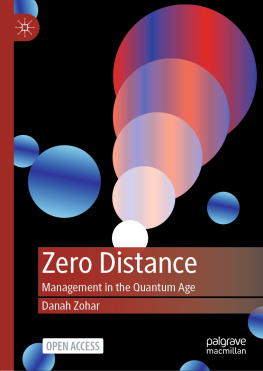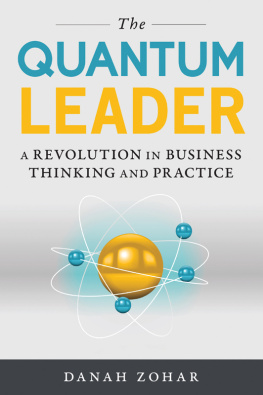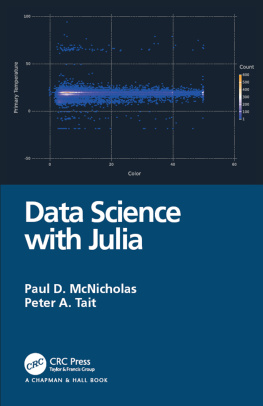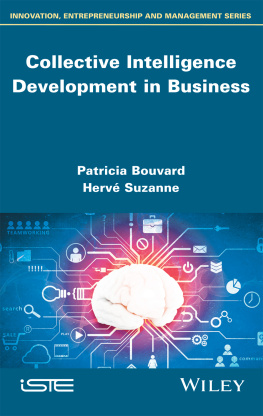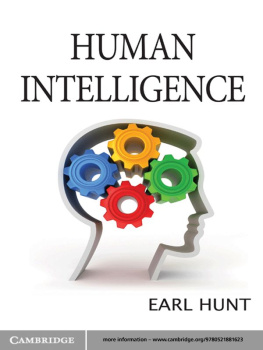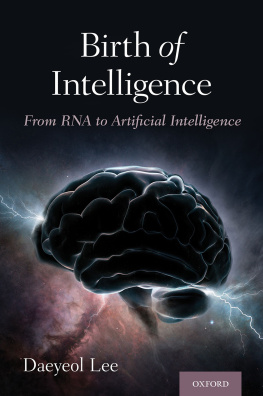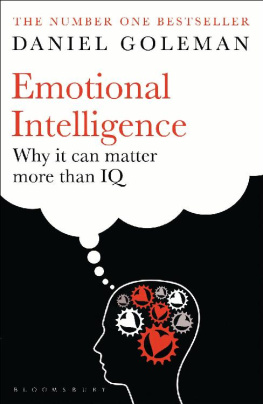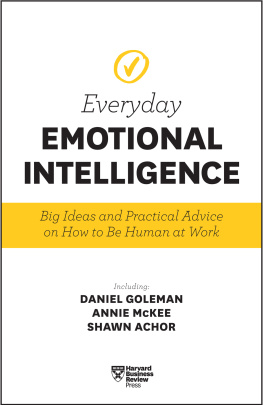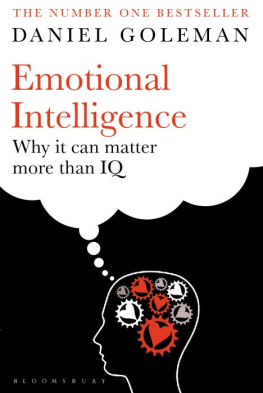To the memory of my father, Donald E. Logan,
Toledo, Ohio. 1919-81
DANAH ZOHAR
UP MY MOTHERS FLAGPOLE
ISRAEL, THE LAND AND ITS PEOPLE
THROUGH THE TIME BARRIER
DANAH ZOHAR AND IAN MARSHALL
THE QUANTUM SELF
THE QUANTUM SOCIETY
WHOS AFRAID OF SCHRDINGERS CAT?
REWIRING THE CORPORATE BRAIN

First published in Great Britain 2000
This electronic edition published in 2012 by Bloomsbury Publishing Plc
Copyright 2000 by Danah Zohar and Ian Marshall
The moral right of the author has been asserted
Bloomsbury Publishing Plc
50 Bedford Square
London WC1B 3DP
A CIP catalogue record for this book
is available from the British Library
ISBN: 978 1 4088 3217 2
All rights reserved. You may not copy, distribute, transmit, reproduce or otherwise make available this publication (or any part of it) in any form, or by any means (including without limitation electronic, digital, optical, mechanical, photocopying, printing, recording or otherwise), without the prior written permission of the publisher. Any person who does any unauthorised act in relation to this publication may be liable to criminal prosecution and civil claims for damages
Diagrams by Kate Simunek
Ox drawings by Ilaira Bouratinos
www.bloomsbury.com/danahzohar
Visit www.bloomsbury.com to find out more about our authors and their books You will find extracts, author interviews, author events and you can sign up for newsletters to be the first to hear about our latest releases and special offers
In gratitude, I would like to thank Quentin Baer and Cambridge Management Consultants for their generous contribution to research and writing time for this book.
Healing from The Complete Poems of D.H. Lawrence by D.H. Lawrence, edited by V. de Sola Pinto, F.W. Roberts, copyright 1964, 1971 by Angelo Ravagli and C.M. Weekley, Executors of the Estate of Frieda Lawrence Ravagli. Used by permission of Viking Penguin, a division of Penguin Putnam Inc., and Laurence Pollinger Ltd.
Lines from I think continually about those who were truly great by Stephen Spender from The Collected Poems, and Little Gidding from Four Quartets by T.S. Eliot used by permission of Faber and Faber Limited.
Lines from Sonnet 4 from Sonnets to Orpheus by Rainer Maria Rilke, edited/translated by C.F. Maclntyre, copyright 1960 by C.F. Maclntyre used by permission of the University of California Press.
Lines from The Lord of the Rings by J.R.R. Tolkien used by permission of HarperCollins Publishers.
Lines from The Duino Elegies by Rainer Maria Rilke, translated by Stephen Cohn, used by permission of Carcanet Press Limited.
Lines from Gitanjali by Rabindranath Tagore used by permission of Visva-Bharati, Publishing Department, Visva-Bharati University, Calcutta.
Lines from Rilke on Love and Other Difficulties by Rainer Maria Rilke, translated by J.J.L. Mood 1975 used by permission of W.W. Norton & Co., New York.
Although this book is written in the first person by Danah
Zohar, its contents are the joint work of the authors
Contents
11. Our Compass at the Edge:
Using SQ to Build a New Ethics
15. Being Spiritually Intelligent in a
Spiritually Dumb Culture
It doesnt interest me what you do for a living.
I want to know what you ache for, and if you dare to dream of meeting
your hearts longing.
It doesnt interest me how old you are.
I want to know if you will risk looking like a fool for love, for dreams, for the adventure of being alive.
It doesnt interest me what planets are squaring your moon.
I want to know if you have touched the center of your own sorrow, if you have been opened by lifes betrayals or have become shriveled and closed
from fear of further pain! I want to know if you can sit with pain, mine
or your own, without moving to hide it or fade it or fix it. I want to know if you can be with joy, mine or your own:
if you can dance with wildness and
let ecstasy fill you to the tips of your fingers and toes without cautioning us
to be careful, be realistic, or to remember the limitations of being a human.
It doesnt interest me if the story youre telling me is true.
I want to know if you can disappoint another to be true to yourself;
if you
can bear the accusation of betrayal and not betray your own soul.
I want to know if you can be faithful and therefore trustworthy. I want to know if you can see beauty even if its not pretty every day, and if you can
source your life from Gods presence. I want to know if you can live with failure, yours and mine, and still stand on the edge of a lake and shout to the silver moon, Yes!
It doesnt interest me where you live or how much money you have.
I want to know if you can get up after the night of grief and despair, weary, bruised to the bone, and do what needs to be done for the children.
It doesnt interest me who you are, how you came to be here.
I want to know if you will stand in the center of the fire with me and not shrink back.
It doesnt interest me where or what or with whom you have studied.
I want to know what sustains you from the inside, when all else falls away.
I want to know if you can be alone with yourself; and if you truly like the company you keep in the empty moments.
The Invitation, inspired by Oriah Mountain Dreamer,
Native American Elder, May 1994
Part I
What is SQ?
In the early part of the twentieth century, IQ became the big issue. Our intellectual or rational intelligence is what we use to solve logical or strategic problems. Psychologists devised tests for measuring it, and these tests became the means for sorting people into degrees of intelligence, known as their intelligence quotient or IQ, that could allegedly signpost their abilities. The higher a persons IQ, the theory went, the higher their intelligence.
In the mid-1990s, Daniel Goleman popularized research from many neuroscientists and psychologists showing that emotional intelligence which, as a convenient shorthand, I term EQ is of equal importance. EQ gives us our awareness of our own and other peoples feelings. It gives us empathy, compassion, motivation and the ability to respond appropriately to pain or pleasure. As Goleman pointed out, EQ is a basic requirement for the effective use of IQ. If the brain areas with which we feel are damaged, we think less effectively.
Now, at the end of the century, an array of recent but so far undigested scientific data shows us that there is a third Q. The full picture of human intelligence can be completed with a discussion of our spiritual intelligence SQ for short. By SQ I mean the intelligence with which we address and solve problems of meaning and value, the intelligence with which we can place our actions and our lives in a wider, richer, meaning-giving context, the intelligence with which we can assess that one course of action or one life-path is more meaningful than another. SQ is the necessary foundation for the effective functioning of both IQ and EQ. It is our ultimate intelligence.
In his book Multiple Intelligences, Harvards Howard Gardner argues there are at least seven kinds of intelligence, including musical, spatial and sporting as well as rational and emotional. But I will argue in this book that all our possibly infinite intelligences can be linked to one of three basic neural systems in the brain, and that all of the intelligences Gardner describes are actually variations of the basic IQ, EQ and SQ and their associated neural arrangements.
Next page

